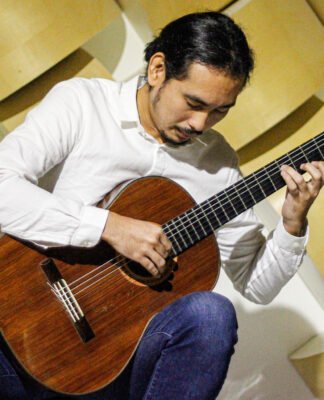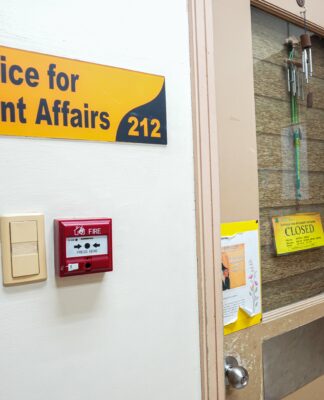IT WAS a nostalgic trip with a simple but tempting premise: step into the shoes of a genius writer.
Last August 15 to September 15, a month-long exhibit titled “The World of Nick Joaquin” was held at the Cubao Expo in Quezon City to pay homage to the life of the National Artist for Literature.Various photos, portraits, and notes about the late literati—most of which were gifts from different artists—were mounted. There, too, were Joaquin’s personal articles that once graced the pages of various publications during the heydays of his journalistic career.
“It’s been five years since his death and I didn’t want his memory to just fade away, said Bing Villegas, Joaquin’s nephew in law and curator of the exhibit.
“I wanted to focus some attention to him, on his word, his works and his world
“That’s why I included his possessions,” he said.Included in the exhibit were pieces of wooden furniture that once composed Joaquin’s sitting room. Here, the writer probably entertained his guests and had them sit on rattan chairs. “That was how simple he was, he had simple furniture,” said Villegas. Across the room lay an old typewriter with Joaquin’s name still taped on it. This was his reliable writing companion in life. According to Villegas, Joaquin was typing his last work using the typewriter before he died. “That’s his desk and typewriter with the photocopy of his last work. It had a paper in it because he was still working up to the last minute,” Villegas said. A peculiar thing about the exhibit was the small number of medals and trophies showcased, which was quite unusual for a man who had received numerous praises and recognitions at the prime of his career. Villegas explained that his uncle rarely kept awards. “I just saw some here and there [and] boxes of medals obviously were just left anywhere. But he had one certificate, the Palanca award [and] it wasn’t even framed. I found it in a filing cabinet, folded and crumpled by the cabinet’s rollers,” said Villegas, who described Joaquin as someone who didn’t get blinded by the pomp of his laurels but simply loved to write.
In fact, Joaquin didn’t want to accept the 1976 National Artist Award given to him by former president Ferdinand Marcos in the first place. “It’s not his type. He even stopped writing during the martial law. But he still accepted the award [after] Marcos [agreed to] release [Joaquin’s] journalist friends who were jailed, particularly Pete Lacaba,” Villegas said.
Man of the beer Nick Joaquin’s love for writing was not far from his love of beer. It has been said that he usually found his muse in writing after downing several bottles of beer. He also drank during interviews with famous personalities.
“It was a requirement for him. If you needed him, then you [had to] provide beer,” Villegas said. Some of Nick Joaquin’s books still survived and were encased in a wooden cabinet. Villegas would point out those that Joaquin donated to UST, most of which now rest in the humanities section of the Miguel de Benavides Library, under the “Esquinita de Quijano de Manila.” The writer came from a family of 12, with a father who was a lawyer and a colonel during the Philippine Revolution and a mother who was a school teacher. His literary roots stemmed from Joaquin’s voraciousness for reading books that later sparked his career in the world of letters. Life was smooth sailing then before the war, but things changed in the late 1930s. “Just before the war in the late 30s, his father lost his fortune in a mining interest. They lost all their wealth,” Villegas said. “Then his parents died.” At a young age, Joaquin had to fend for himself and his siblings even if it meant taking odd jobs like working for a bakery. He didn’t get to finish his secondary education; instead, he went to the National Library every day and buried himself in the books. At 17, Joaquin’s poems began to appear in various publications while he also worked as a proofreader. He reaped various awards for his works that were published in the Herald Midweek Magazine and the Philippines Free Press. He also received an Associate in Arts degree from UST. In 1949, Joaquin won a Dominican-sponsored literary contest for his opus “La Naval de Manila.”
The Dominicans liked it so much that they offered him a scholarship in Hong Kong, where he studied at the St. Albert College, becoming a Dominican seminarian for a while. He also received an Associate in Arts degree from UST. “He felt that he had a vocation to the priesthood because he had a [great] devotion to Mother Mary, particularly to La Naval. So with that, he felt close to the Dominicans,” said Villegas. Joaquin left the seminary in 1950 and returned to the Philippines to pursue his original calling. Since then, he had carved a name for his poems, stories and plays under the pen name Quijano de Manila.
A three-time Don Carlos Palanca Award winner, Joaquin was awarded the 1996 Ramon Magsaysay Award for Literature, Journalism, and Creative Communication. Maria Joanna Angela D. Cruz and Julienne Krizia V. Roman
















